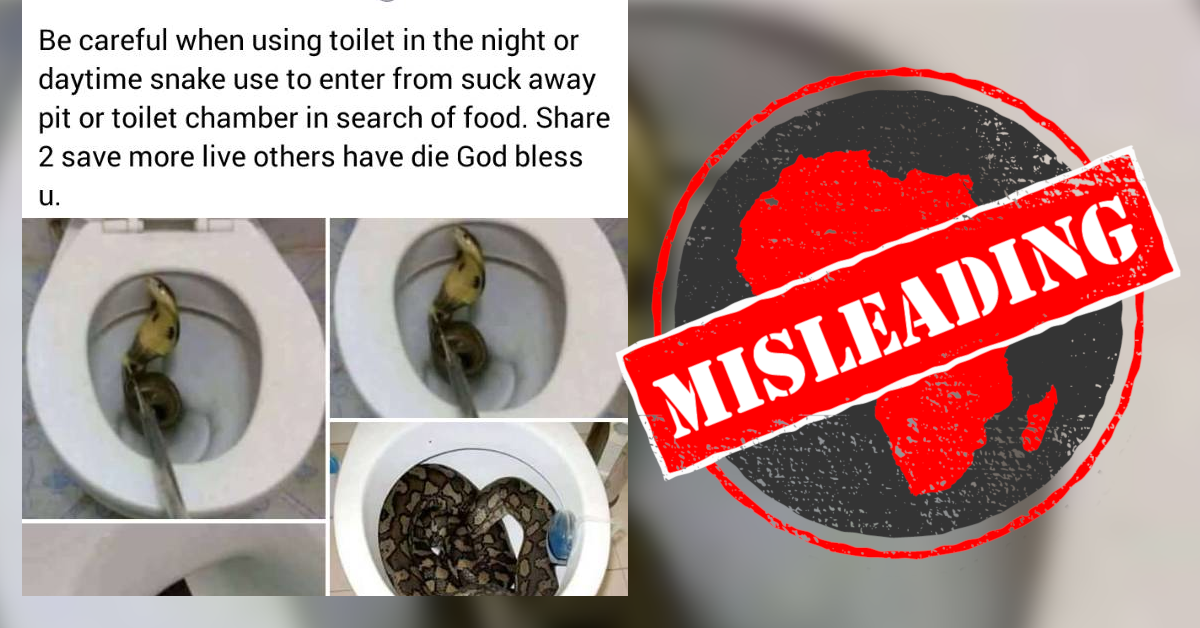Can snakes get into people’s homes through the toilet?
That’s the claim in a graphic on Facebook that’s been shared more than 80,500 times so far.
It shows two photos of what seem to be snakes in toilet bowls. The text reads: “Be careful when using toilet in the night or daytime snake use to enter from suck away pit or toilet chamber in search of food. Share 2 save more lives others have die God bless.”
The photos suggest that “suck away pit” refers to the toilet bowl. In other words, snakes can enter the home through the sewage system.

There have been many recorded instances of people finding snakes in their toilet bowls, across the world.
A snake was found in the toilet of a US Starbucks outlet in 2013. A venomous snouted cobra was discovered in a toilet bowl in a South African apartment block in 2016. A Thai woman was bitten while using the toilet in 2017, and an Australian woman bitten by a snake in her toilet in January 2019.
The phenomenon appears to be increasing in Thailand. According to Reuters, Thai officials in Bangkok received 37,000 reports of snake home invasions in 2018 with snakes being found in people’s gardens, homes, and toilet bowls. The figure has risen from 10,492 reported in 2012.
But according to Brad Shaffer, a professor of ecology and evolutionary biology at the University of California who was interviewed by National Geographic, snakes are more likely to end up in a toilet by wriggling into the bowl rather than climbing up through the pipes.
While it is technically possible, it is highly unlikely that a snake will enter your home through the pipes. The snake would face a number of obstacles on the way, including cold temperatures and difficulties finding an exit from the pipes.
There is a chance of finding a snake in your toilet bowl, but there is little reason to fear this actually happening.
In Bangkok and parts of Australia, snake home invasions have increased as cities develop over wild snakes’ natural habitat, leaving snakes with few other options. In Australia, more snakes are spotted in toilet bowls on hotter days.
Even with the increased sightings, the phenomenon outside of Bangkok remains rare.
According to National Geographic, snakes seek out toilet bowls to potentially find prey and a hiding place in an environment that is dark and quiet. The water in the bowl keeps them cool in the heat and provides a source of drinking water for thirsty snakes.
Snakes can sometimes be found in toilets. But they’re way more likely to get there once they’re already in the home. – Naledi Mashishi
That’s the claim in a graphic on Facebook that’s been shared more than 80,500 times so far.
It shows two photos of what seem to be snakes in toilet bowls. The text reads: “Be careful when using toilet in the night or daytime snake use to enter from suck away pit or toilet chamber in search of food. Share 2 save more lives others have die God bless.”
The photos suggest that “suck away pit” refers to the toilet bowl. In other words, snakes can enter the home through the sewage system.

Snakes can enter toilets, but not through pipes
There have been many recorded instances of people finding snakes in their toilet bowls, across the world.
A snake was found in the toilet of a US Starbucks outlet in 2013. A venomous snouted cobra was discovered in a toilet bowl in a South African apartment block in 2016. A Thai woman was bitten while using the toilet in 2017, and an Australian woman bitten by a snake in her toilet in January 2019.
The phenomenon appears to be increasing in Thailand. According to Reuters, Thai officials in Bangkok received 37,000 reports of snake home invasions in 2018 with snakes being found in people’s gardens, homes, and toilet bowls. The figure has risen from 10,492 reported in 2012.
But according to Brad Shaffer, a professor of ecology and evolutionary biology at the University of California who was interviewed by National Geographic, snakes are more likely to end up in a toilet by wriggling into the bowl rather than climbing up through the pipes.
While it is technically possible, it is highly unlikely that a snake will enter your home through the pipes. The snake would face a number of obstacles on the way, including cold temperatures and difficulties finding an exit from the pipes.
Snakes in toilets relatively rare
There is a chance of finding a snake in your toilet bowl, but there is little reason to fear this actually happening.
In Bangkok and parts of Australia, snake home invasions have increased as cities develop over wild snakes’ natural habitat, leaving snakes with few other options. In Australia, more snakes are spotted in toilet bowls on hotter days.
Even with the increased sightings, the phenomenon outside of Bangkok remains rare.
According to National Geographic, snakes seek out toilet bowls to potentially find prey and a hiding place in an environment that is dark and quiet. The water in the bowl keeps them cool in the heat and provides a source of drinking water for thirsty snakes.
Snakes can sometimes be found in toilets. But they’re way more likely to get there once they’re already in the home. – Naledi Mashishi
Republish our content for free
For publishers: what to do if your post is rated false
A fact-checker has rated your Facebook or Instagram post as “false”, “altered”, “partly false” or “missing context”. This could have serious consequences. What do you do?
Click on our guide for the steps you should follow.
Publishers guideAfrica Check teams up with Facebook
Africa Check is a partner in Meta's third-party fact-checking programme to help stop the spread of false information on social media.
The content we rate as “false” will be downgraded on Facebook and Instagram. This means fewer people will see it.
You can also help identify false information on Facebook. This guide explains how.



Add new comment